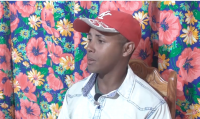“The reality in Cuba remains hidden. People do not want to see what they are living today.”

Download image
Georbanelis Betancourt Lopéz was born in 1988 in Guantánamo, Cuba. In reaction to his mother’s problems as a chronic alcoholic and frequent jail time, he tried to be a good citizen and not seek problems with the communist system throughout his adolescence. At the end of the first decade of the new millennium, he was accused of having killed a cow and sanctioned to a fine and exclusion from the “Labour Office” [Casa del Trabajo]. For this reason, he sought work as a fumigator, as he did not have many other options. In 2012, he was forced to join the “Rapid Response Brigade” [Brigada de Respuesta Rápida] and participated in the campaign “Quick Aid” [Respuesta Rápida] which was responding to the cholera epidemic in Cuba. He currently works as a mason and is dedicated to independent journalism. He aims to report on the difficult living conditions most Cubans endure. He lives in Guantánamo with his wife and two children, who are frequently ill due to poor living conditions and inappropriate hygienic standards provided by the Cuban Government.
